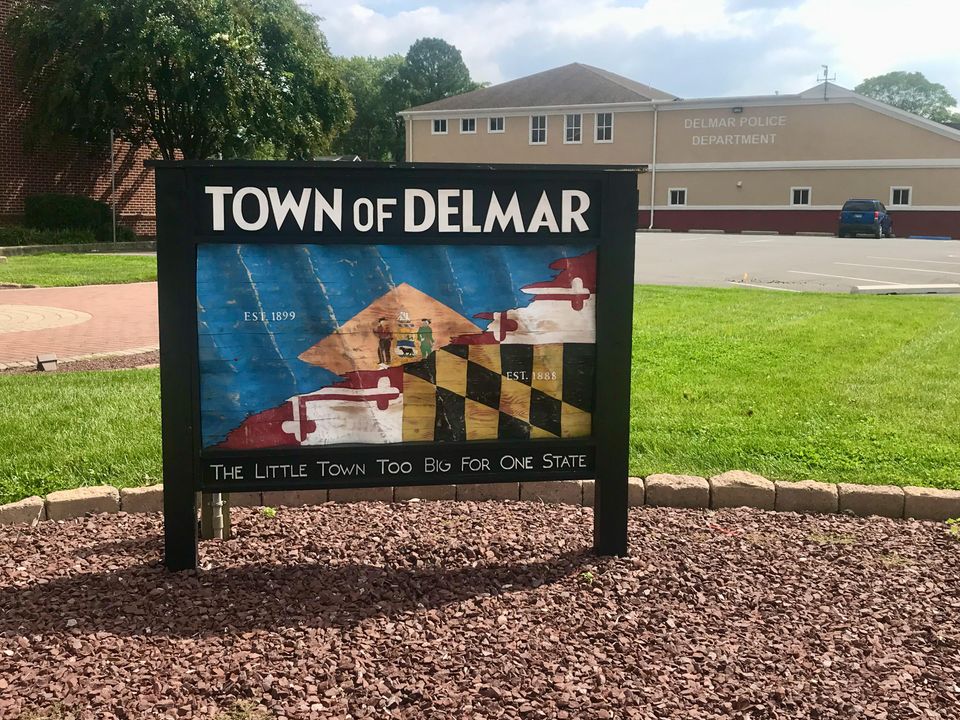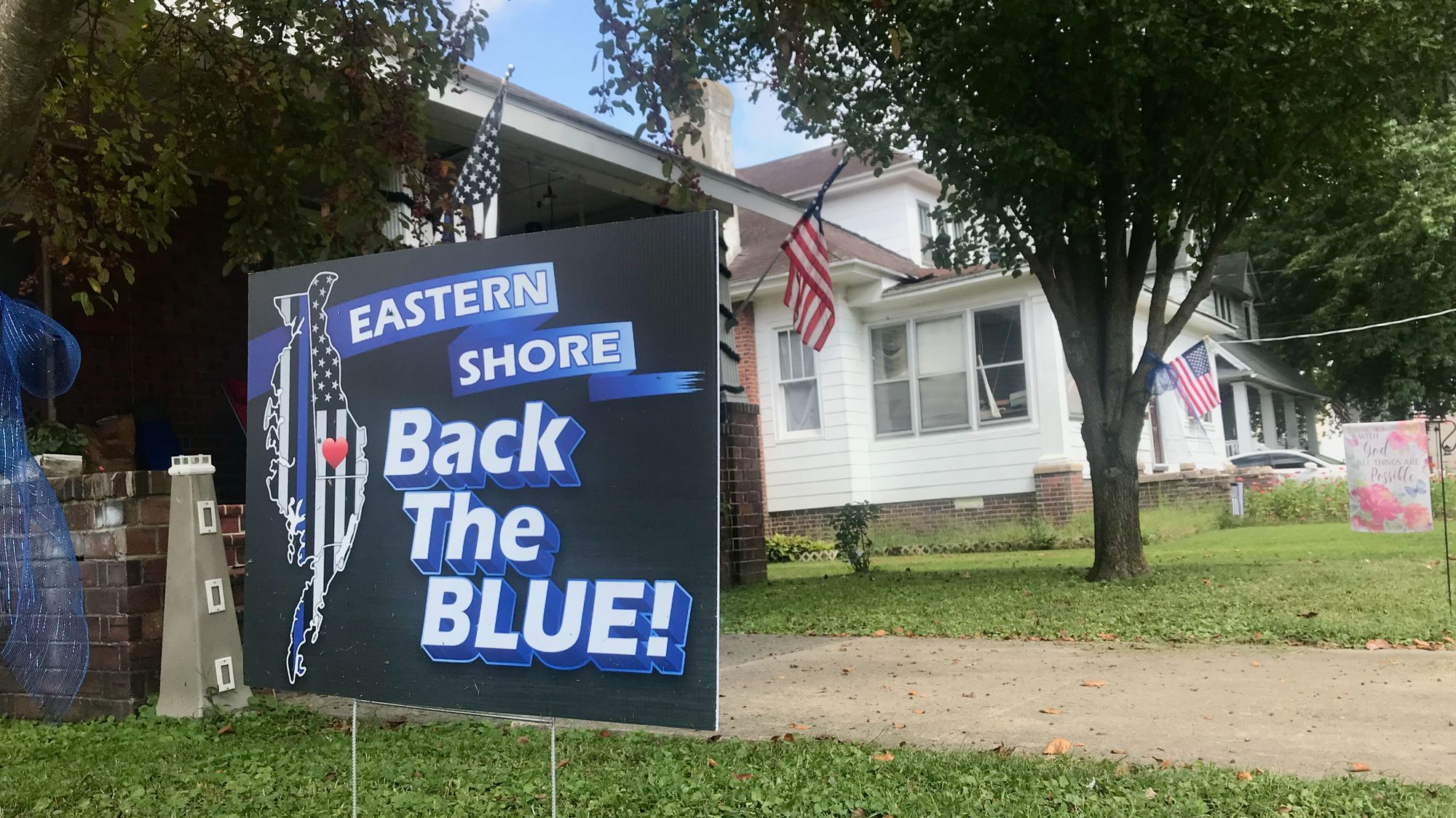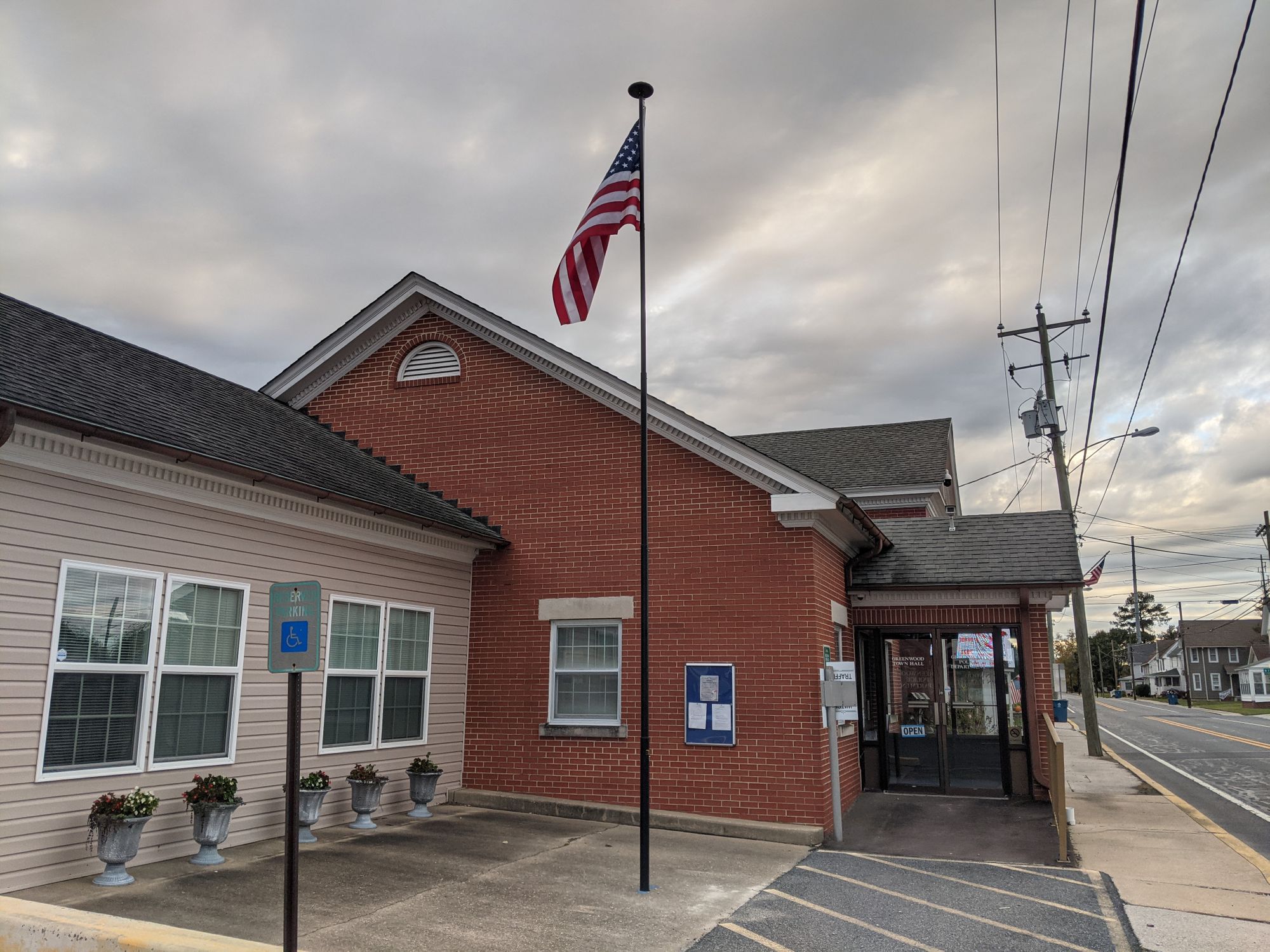Meet the candidates for Delmar mayor and Commission

By Tony Russo
When the residents of Delmar, Maryland go to the polls on Nov. 16 there may be more at stake than just the makeup of the Maryland Commission. The recently signed police union contract will have to be funded for at least three years, the town’s failing wastewater infrastructure will have to be funded and as the schools fill up, the bi-state agreement that allows children from Maryland and Delaware to attend in-town schools in separate states may come under fire.
Beyond that, tension between police advocates and the Maryland mayor and commission has undermined courtesy at recent town meetings.
The tension has also given rise to an opposition party. Three men with no prior experience in town government are running in the hope of having a majority on the first day.

Mayoral Candidate Benjamin Jorden and two commission candidates Jacob Boothe and Cory Shaffer are asking the town’s voters to give them complete political power, allowing them to bypass dissent among the other elected officials.
Neither Jorden nor Shaffer granted an interview for the story, though they claimed they would speak with anyone at any time. None of the three will say anything about their plans except that they will figure it out once they are elected, as Boothe said in the interview he granted.
Election Day in Delmar is 7 a.m. to 7 p.m. Tuesday, Nov. 16 at the Maryland Town Hall.
I interviewed three of the five candidates running for office. Each of them made an opening and closing statement and answered essentially the same questions involving the tax structure, how growth affects the wastewater and school issues, and what they believed the town could do to better promote unity after a divisive year.
In addition to the interviews, we have provided links to the audio so voters can hear the candidates in their own words. The answers are complete, but the questions have been truncated for time and context.
Sign up to get more local coverage like this from The Delaware Independent
Karen Wells, running for reelection as mayor
Incumbent mayor Karen Wells has endured more than a little anger and accusation in the last few months as activists have blamed her for the town’s failure to get a deal with the police union done more quickly. Wells is seeking reelection because, she said, she has no illusions about what is at stake in the coming months and believes she has the experience to guide Delmar through the transition into its next massive growth period.
Much of the growth the town has seen is the result of decisions and approvals made before she was mayor, although she was on the commission for several of those. Wells was a 2015 graduate of the Academy for Excellence in Local Governance and served as the president of the Lower Eastern Shore Mayor’s Association.
On growth:
The difficulty the town has been facing, lacking money to pay police or to improve infrastructure, is because the growth didn’t pay for itself. Now left with difficult decisions about the town’s future, Wells hopes to shift much of the burden of future growth onto new construction rather than just raising taxes.
“What we have in place now can’t be removed,” she said. “I can’t stop the building from the subdivisions that are already here, but we’ll have to try and manage the growth and capitalize on it.”
On the schools:
Managing growth is a significant challenge when it comes to the schools. Although the bi-state agreement allows the two states to share schools, Wicomico County and the state of Maryland haven’t made accommodations for the skyrocketing number of students on the Delmar side. As pressure mounts to deal with the student increases, the bi-state agreement has come under attack in the past.
“While I have no control over the (Maryland and Delaware) school boards, it’s quite clear that we are maxing out on enrollment in both schools. I’m willing and ready to fight to keep our municipal kids in our municipal schools,” Wells said.
On the budget:
While costs associated with new police hires will be funded from town reserves for the current fiscal year, next year’s budget will have to accommodate not only the increased police costs but also the fixed cost of annual raises for the next three years.
Wells said through negotiation the town was able to reduce the likely property tax increase from 0.78 to hopefully something a little closer to 0.71, (last year’s rate was 0.6797) which she hopes will be a sustainable amount for the next three years of police increases. That, she said, should give the town room to find a way for new growth to fund itself.
“I know people are talking about impact fees. The impact fees we have now are for water and sewer connections; there were no impact fees put into place for soft infrastructure, and I’m hoping to be able to add that,” she said.
Delmar hasn’t established the kind of impact fees that would allow it to maintain the infrastructure, or special tax areas to accommodate growth and the additional revenues that will be needed to bolster the infrastructure.
“That’s what we’ll need to sustain the salary structure without being too much of a burden on the taxpayers,” she said.
On wastewater issues:
As with accommodating the new police expenses, Wells said a new impact fee structure can help defray taxpayer cost for upgrading the infrastructure. While her opponents have claimed that the town is out of capacity, the town manager says the problem has more to do with failing infrastructure than it has to do with a lack of capacity.
Wells has some experience in this, having been a commissioner for the last infrastructure upgrade. She said she has shepherded the most recent grant proposal to fund some of the infrastructure repairs in early 2022.
On Facebook:
Wells has been under criticism for the way that some members of the commission have used the town’s Facebook page for more than information updates. While there seems to have been a turn away from some of the politically-edged posts, it still happens occasionally.
“We are starting to form a policy, but no one is in place at this time,” she said.
On unity:
While Wells said she expects civility to return to town meetings now that the highly-charged police union issue has been resolved, she said she understood the anger and confusion and hopes to incorporate those lessons going forward during the comment section of commission meetings.
“It’s kind of hard to answer some questions while I’m having other questions yelled at me,” she said. “I don’t like engaging at the meeting. I would rather go back and do my research because I don’t always have all (the necessary information to answer) with me.”
Jacob Boothe, running for commission
Commission candidate Jacob Boothe is one of the three candidates running together. A longtime resident, Boothe has declined invitations to run for the Delmar Commission in the past, but in light of recent events decided that he would run this year. Boothe believes the town suffers from a lack of perspective and said he believed new eyes on town operations might help.
His platform rests on the proposition that Delmar needs change and that he and his friends should be the people to effect that change. Although if all three were elected the proposed voting bloc would have a majority, enabling them to enact changes over the objection of the rest of the council, Boothe said they don’t plan to behave that way.
Boothe used “we” when describing many of the platform pieces, such as slowing growth in the town and forming a better working relationship with the police and other departments. Boothe said he and the other candidates running as if on the same ticket would improve communication between the police and the town.
On the voting bloc:
Three candidates are hoping to all be elected together. Given that the mayor breaks all ties in the vote, the bloc would not have to acknowledge the other two members of the commission.
While Boothe admitted that was the case, he dismissed the notion that the three candidates wouldn’t take alternative opinions into account.
“If all three of us get elected, we want to work with the other two. Their opinion would matter,” he said.
If the bloc fails to get any traction, that is, if he is elected and the other two aren’t, Boothe said he believes he could work with whomever.
“Our vision is the same for the town,” he said. “It’s about unity.”
On unity:
The interview took place in the wake of the particularly contentious Oct. 11 Delmar Commissioners meeting, the latest in a series of meetings where the commissioners faced harsh criticism for the delays in the police union negotiations.
“People are angry and they have the right to speak,” he said. “You experienced that last night.” Boothe was in attendance at the meeting.
He said he didn’t think interacting with an angry public would be a problem for him, but that some amount of decorum should be expected.
“Hopefully, calmness and the transparency we’re all hoping for, hopefully, the tension will not be like it is right now,” he said.
On the budget:
Rather than make promises he doesn’t know whether he can keep, Boothe was vague about specific plans. He said there wasn’t enough information in the budget posted on the town website to say where cuts could be made, but that a fresh set of eyes might see opportunities for efficiencies.
Regarding the likelihood of a tax raise, Boothe initially said that the tax increase was necessary.
“There will be a tax raise, but it will be on this (current) administration,” he said.
However, if elected he will participate in the budgeting process and will have a say on whether or not taxes have to be increased to begin to accommodate the new police union and the town’s infrastructure.
“Why would I want to raise taxes on myself?” he said.
On growth:
As with the other issues, Boothe said he wouldn’t know for sure what he and the others would do until they were elected and had a chance to look at everything from the inside. He proposed a moratorium on all construction until the new administration got up to speed.
“No more construction until we get a grip on what’s going on,” he said.
Faith Higbee, running for commissioner
Commission candidate Faith Higbee has been teaching at Delmar Junior Senior High School for 30 years. She considered running for commissioner in the past but worried she wouldn’t have enough time to give the position the time and attention it deserved. A recent empty-nester who plans to retire from teaching in the next few years, Higbee said she can now devote the extensive amount of time needed to be an engaged, involved commissioner.
“I felt like I had the time to give to the office that it deserved, and that’s why I’m running,” she said.
In addition to having been a teacher, Higbee has experience as a member of the teachers union. She spent several years as a member of the school’s negotiation committee and said she understands there has to be an openness and a give and take between the administration and the union.
“It’s difficult, there are a lot of moving pieces to a contract, and so I think having that experience, going forward I can bring that perspective of doing collective bargaining,” she said.
On the budget:
“We look at the budget that’s presented to us, I’m familiar with looking at that. I understand how to read them, I understand what they are.”
Higbee said she knew the town would have to find additional sources of revenue to be able to afford more police officers and she hoped to try and increase the tax base by encouraging new business.
She said whether she was elected or not, she hoped that whoever was on the commission would look into the proposal by Maryland Governor Larry Hogan to provide towns additional funding for police salaries, body armor and training.
While Higbee believes a tax increase may be necessary, she hopes to establish a way of dealing with growth in the budgeting process that can take some of the sting out of it for residents.
“I do think there are creative ways to find funding that we haven’t considered,” she said.
On wastewater:
Tied in with the question of growth, Higbee said the current approach to wastewater isn’t sufficient for the amount of growth.
“We’re really good at encouraging people to come here, but we’re not so good at keeping up with that growth,” she said. “I agree with that 100 percent.”
On the schools:
As a teacher at the high school Higbee said the town and school have a really good working relationship. The school, she said, feels as if the town has its back. She does have concerns about the bi-state agreement that allows kids from either state to attend in-town schools.
“There’s been a lot of talk about getting rid of the bi-state agreement and having two school systems, and I would really hope that the town supports this bi-state agreement existing forever,” she said.
On the future:
Higbee said in addition to addressing problems she would like to be a catalyst for a renewed sense of community. To that end, she hopes to promote more of the townwide events that have fallen off in recent years.
Among them is the Christmas tree lighting event in the park.
“My mom was in charge of that for a lot of years, the whole town would come out,” she said. “High school kids would read stories to the younger kids, there would be hot chocolate.”
She would also like to restore the town’s participation in National Night Out, a program to strengthen the relationship between the town’s police and its residents.
In the longer term, Higbee also would like to encourage other community-building programs and events, including investigating the possibility of a dog park, which she said would be an opportunity for adults to interact socially.
Another program goal would be to see about more youth programs. Higbee worried about the toll COVID separation has taken on the town’s youth and hoped to encourage more and healthier interaction between children.
On unity:
Higbee wants to be a voice for moderation and envisions a time when people will be in more contact with their commissioners than just at the meetings. She has avoided the town meetings, preferring to review the records afterward.
“With all the turmoil and all the drama that was going on, I really didn’t want to get sucked into that,” she said. “I wanted to be able to get my own perspective on things.”
She doesn't think they have to do collective bargaining in such an adversarial way, she added. “I see myself as a team player.”
More stories:


